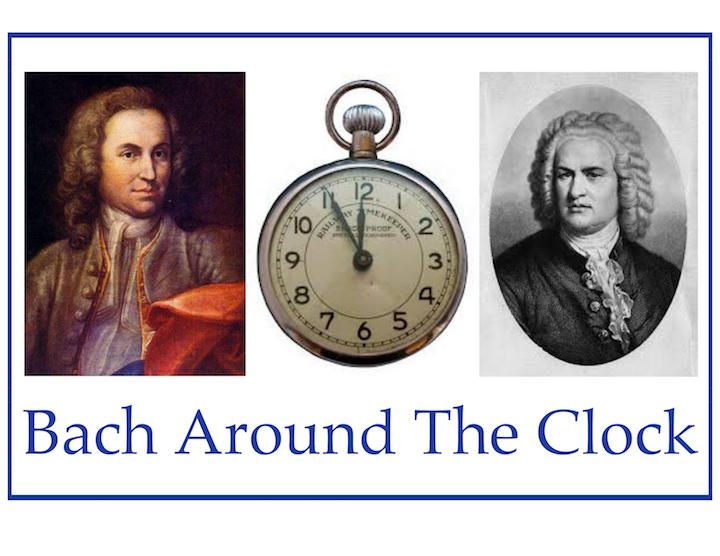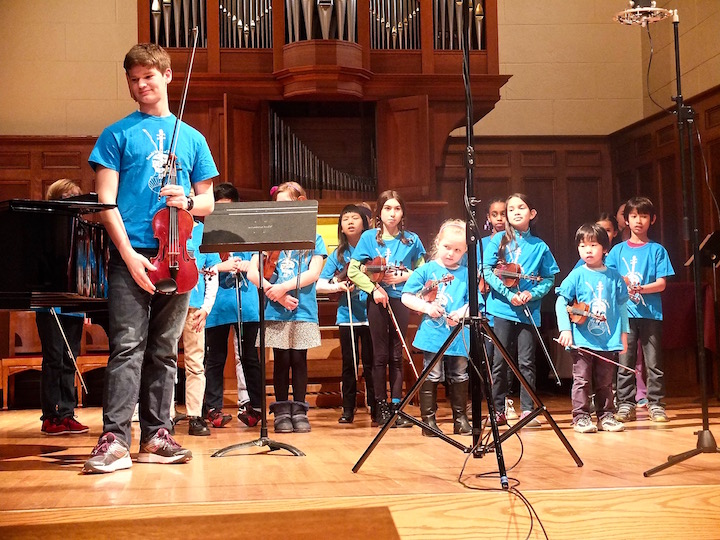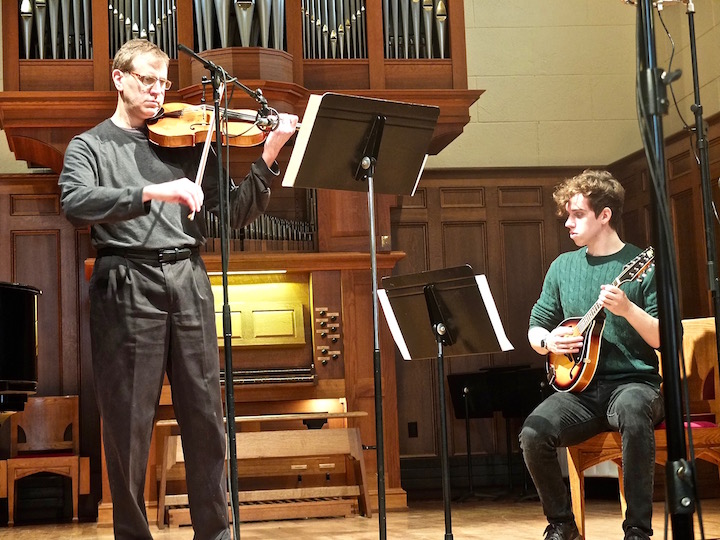The Well-Tempered Ear
Classical music: Bach Around the Clock 2018 will be March 10. Here is a year-end update with impressive news and important changes
2 Comments
By Jacob Stockinger
Violist Marika Fischer Hoyt, who last March successfully revived Bach Around the Clock after Wisconsin Public Radio dropped it five years ago, has sent the following year-end update that is full of impressive news, including this year’s date and a smart change of hours to 10 a.m. to 10 p.m. instead of noon to midnight:
“Bach Around The Clock,” the annual community celebration of the music of Johann Sebastian Bach (1685-1750), exceeded all expectations in 2017.
“Approximately 80 performers were seen by almost 600 audience members. The performers ranged from beginning students (below top is a photo of the Suzuki Strings of Madison) to adult amateurs (below bottom is amateur pianist Tim Adrianson) to seasoned professionals including the Wisconsin Chamber Choir and the Madison Bach Musicians.
“The audience ran from around 300 persons at the church to 267 live-stream viewers, some from as far away as London, England.
“BATC gratefully acknowledges the valuable support received from Early Music America (EMA). In registering as a Partner of Early Music Month (an EMA initiative), BATC joined nearly 270 individual and organization Partners across the country whose events during the month of March were showcased on EMA’s website and social media.
“The enthusiastic Madison community response to BATC 2017 furnished strong supporting materials for an application for EMA’s coveted Outreach Grant. BATC, one of five organizations to win the award, received $500 and national recognition.
“As artistic director, I flew to Boston in June to attend the award ceremony, presided over by EMA Executive Director Ann Felter (below). The award will help cover the cost of the sound engineers who record and live-stream the 2018 event.
“While in Boston Marika was able to consult extensively with harpsichordist and internationally recognized Bach scholar Raymond Erickson (below), who kindly offered insights and perspective on how to build a successful Bach festival.

“BATC 2018 — to mark Bach’s 333rd birthday — is scheduled for Saturday, March 10, from 10 a.m. to 10 p.m., again at St. Andrew’s Episcopal Church (below), 1833 Regent Street. Local luminaries will again take shifts as onstage emcees.
“The program will open once again with individuals and ensembles from the St. Andrew’s congregation, and continue with musicians from the Madison community and far beyond.
“In 2017, BATC attracted performers (below) from Milwaukee, Dubuque, Oshkosh and Chicago. For 2018 we’ve already been contacted by a pianist from North Carolina who wants to come perform The Well-Tempered Clavier, Book II. It’s safe to say that the festival’s impact has expanded!
“New this year is the Ensemble-In-Residence, Sonata à Quattro, which will perform as a featured ensemble, and also play a supporting role for singers wanting to perform an aria, or solo instrumentalists wanting to play a concerto. (In the YouTube video at the bottom, you can hear the gorgeous slow movement of the Keyboard Concerto No. 5 in F minor.)
Led by violinist Kangwon Kim (below), the core ensemble includes strings and harpsichord, and will add obbligato instruments as necessary. Sonata à Quattro will also offer a Fringe Concert during the Madison Early Music Festival at the UW-Madison in July.
“Partner organizations this year will include EMA, as well as the UW Chazen Museum of Art, where BATC ensembles will perform a preview concert on March 4, on the “Sunday Afternoon Live” series. Radio interviews on WORT-FM 89.9 and Wisconsin Public Radio are also in the works. Details will be announced in the coming weeks.
“St. Andrew’s will again make their beautifully remodeled Parish Hall available as a place for performers and audience members to enjoy refreshments, fellowship, restrooms, comfortable couches, and free wi-fi. Many thanks are due to the church staff and congregation, for providing BATC with a home.
“BATC is also in the process of establishing its status as a 501(c)(3) nonprofit organization, which should help secure donations and funding. Completion of this process is expected in the next week or so, and will be announced on the BATC website and Facebook page.
“In addition, a board of directors is also being assembled, which should help ensure the survival on BATC by sharing the workload and responsibilities.”
Here is a link to the website, which has other links and information:
https://bacharoundtheclock.wordpress.com
Tags: adult, amateur, Ann Felter, aria, Artistic director, Arts, award, Bach, Bach Around the Clock, birthday, blog, Board of Directors, Boston, celebrate, Cello, ceremony, Chamber music, charity, Chazen, choral music, church, Classical music, Compact Disc, composer, concerto, donation, Early music, Early Music America, engineer, England, ensemble, Episcopal, Facebook, fellowship, festival, finances, Great Britain, harpsichord, impact, individual, instrument, international, interview, Jacob Stockinger, Johann Sebastian Bach, live, live-stream, London, Madison, Madison Bach Musicians, Madison Symphony Orchestra, march, Music, non-profit, nonprofit, obbligato, Orchestra, partner, performer, Piano, preview, professional, Radio, Raymond Erickson, recognition, record, refreshment, restroom, scholar, solo, Sonata, Sound, St. Andrew, St. Andrew's, stage, stream, Student, Sunday Afternoon Live, survival, Suzuki, Suzuki Strings of Madison, symphony, UK, United Kingdom, United States, University of Wisconsin-Madison School of Music, University of Wisconsin–Madison, Viola, Violin, vocal music, Website, wi-fi, wifi, Wisconsin, Wisconsin Chamber Choir, Wisconsin Chamber Orchestra, wisconsin public radio, work, WORT-FM 89.9, YouTube
Classical music: Art and politics continue to clash as Venezuela President Nicolas Maduro cancels the U.S. tour by that country’s youth orchestra with superstar maestro Gustavo Dudamel
Leave a Comment
By Jacob Stockinger
In the Age of Trump, art and politics continue to increasingly mix and do battle.
One of the latest developments is the decision by President Donald Trump and First Lady Melania Trump not to attend the Kennedy Center Honors – in order, they say, not to disrupt the awards ceremony with politics.
The move came after several recipients protested Trump and his policies.
But Trump’s America isn’t the only place such conflicts between art and politics are happening.
Take the case of superstar conductor Gustavo Dudamel (below, rehearsing the youth orchestra in a photo by Getty Images).
Dudamel was trained in the El Sistema program for youth music education and eventually led the Simon Bolivar National Youth Orchestra of his native country Venezuela before becoming the acclaimed music director and conductor of the Los Angeles Philharmonic, where he still pioneers music education for poor youth.
For a while, Dudamel’s critics protested his unwillingness go speak out about serious problems in his native country. (Below, you can hear Dudamel and the orchestra opening last season at Carnegie Hall.)
But recently Dudamel spoke out against the abuses of Venezuelan President Nicolas Maduro, who, amid many crises, has taken steps to consolidate his power as a dictator.
As retaliation, Maduro (below) cancelled a four-city tour of the U.S. by Dudamel and the Simon Bolivar National Youth Orchestra of Venezuela, although some of Maduro’s defenders cite the country’s dire financial situation.
Here is the story that appeared on the Deceptive Cadence blog by National Public Radio (NPR):
Tags: abuse, America, Art, awards, blog, boycott, Carnegie Hall, ceremony, clash, conductor, conflict, country, critics, Deceptive Cadence, dictator, Donald Trump, El Sistema, finances, financial, First Lady, First Lady Melania Trump, Getty Images, Gustavo Dudamel, John F. Kennedy Center for the Performing Arts, Kennedy Center, Kennedy Center Honors, Los Angeles, Los Angeles Philharmonic, Maduro, Music director, Music education, National Public Radio, National Youth Orchestra, Nicolas Maduro, NPR, pioneer, Politics, poor, poverty, power, President, President Donald Trump, President Maduro, President of the United States, retaliation, Season, Simon Boliver Symphony Orchestra, superstar, tour, U.S., United States, Venezuela, White House, Youth, Youth Orchestra
Classical music: How can the Metropolitan Opera — and others arts groups — increase attendance? New York Times critics offer suggestions.
5 Comments
By Jacob Stockinger
It’s no secret that a lot of classical music organizations in the U.S. are looking for new ways to attract bigger audiences and especially younger audiences.
Even some of the world’s most prestigious organizations are feeling the pain and sensing the scare.
Take the Metropolitan Opera (below) in New York City.
Apparently, attendance at the world-famous opera company is dangerously low, putting the Met in financial and, eventually perhaps, artistic trouble.
So this past week, several of the music critics for The New York Times offered their suggestions about how to improve attendance at the Met. The suggestions include cheaper tickets, different repertoire and special events.
The story has relevance to the Madison scene, especially as many arts groups face similar challenges even at they are announcing their new seasons and seeking new subscribers.
It is also relevant to Madison both because of what yet remains to be done but also because of some of the things—like Sunday afternoon performances – that are already being done.
The Ear found it a good read, loaded with food for thought. (Below is an illustration by Peter and Maria Hoey). He hopes you agree. Here it a link:
The Ear also thinks for some groups that shorter concerts, more informal concerts and lower prices would be helpful.
Do you have ideas you care to share?
Just put them in the COMMENTS section.
The Ear wants to hear.
Tags: artistic, Arts, attendance, audience, choral music, Classical music, finances, financial, Jacob Stockinger, Madison, Met, Metropolitan Opera, Music, New York City, New York Times, old, opera, United States, University of Wisconsin-Madison School of Music, University of Wisconsin–Madison, young















